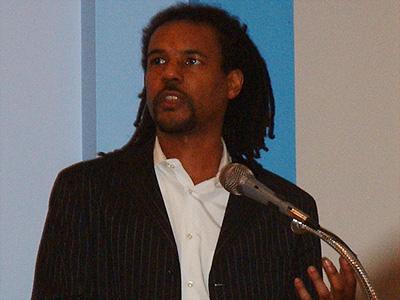Colson Whitehead’s new book on politics, class and zombies
Whitehead giving a lecture at Pennsylvania State University in 2007 (photo courtesy of George Chriss).
Story from The Takeaway. Listen to audio for full report.
Colson Whitehead is best known for his contemplative novels on American condition.
From his coming-of-age story, “Sag Harbor,” to the industrial era of “John Henry Days,” Whitehead has carved a niche for himself in American literature.
And now Whitehead can add “zombie apocalypse” to his niche.
In what at first may seem like a bit of a sci-fi departure for Whitehead, his new novel, “Zone One,” examines how American society would react in a hypothetical zombie crisis. But “Zone One” is as much a zombie book as “Moby Dick is a whale book,” Whitehead explains.
“It’s about overcoming calamity in all different forms,” Whitehead says of the novel. “Big and small, and more personal disasters.”
Although Whitehead began writing the book long before the Occupy Wall Street movement began, “Zone One” is full of parallels to the protest. In the book, survivors of the crisis have staked out a section of the city (everything below Canal Street) and fight to retain control over it from the zombie invaders. But the real connection is evident in Whitehead’s critical prose.
An excerpt from the novel describing a Wall Street banker-turned zombie reads,
The city had long carried its own plague. Its infection had converted this creature into a member of its bygone loser cadre into another one of the broke, the misfitting, the inveterate unlucky.
Whitehead doesn’t deny that the floundering economy of the real world and the book’s post-apocalyptic state share some common themes.
“I feel like in an apocalypse, when you’re trying to get things back to normal, everything that was terrible will come back very quickly,” Whitehead said. “Bureaucracy, marketing, corporate sponsorships, people who want their arugula back. They all come back.”
—————————————————
“The Takeaway” is a national morning news program, delivering the news and analysis you need to catch up, start your day, and prepare for what’s ahead. The show is a co-production of WNYC and PRI, in editorial collaboration with the BBC, The New York Times Radio, and WGBH.
